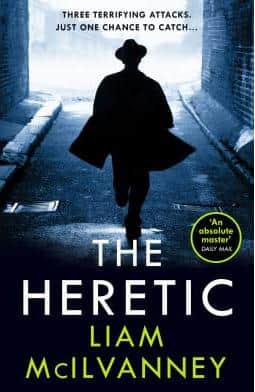Book review: The Heretic, by Liam McIlvanney


The Heretic is a well-plotted and very enjoyable novel, an outstanding example of Tartan Noir. Any aspiring writer intending to venture into this field would do well to study it and learn from it, for McIlvanney is a fine craftsman who knows just what he is doing and how to do it. There is a wide range of characters, several stereotypes as is almost inevitable in what is among other things a police procedural. The plot is complicated, hovering on the brink of the improbable, but never quite tumbling into it. The city of Glasgow is itself a principal character and I would guess that if you followed the narrative with a street guide to hand you would find no mistakes.
The novel is set in 1975 and this is, for several reasons, a good thing. The Glasgow of 45 years back is recognizable today, yet darkly different. The heart was being stripped out of the Victorian city as motorways were driven through it and neighbourhoods destroyed. It was a time of ferment, the time also of the Troubles across the Irish Sea and Glasgow, as McIlvanney makes compellingly clear, had more in common with Belfast than with Edinburgh. Gang bosses ruled certain parts of the city, or were believed to do so, and the police were unconstrained by requirements to record interviews with anyone brought in for questioning. The police may not have been as aggressive in real life as they are in these novels, but they were aggressive and confessions were obtained by means now unlawful. There were corrupt policemen, though not as many as you meet in fiction.
Advertisement
Hide AdSetting a crime novel almost half a century back also frees the author from encumbering his fiction with too much modern technology and scientific knowhow; no need to employ DNA testing rather than a policeman’s wit to solve murder.


If this is, as I say, a very good example of Tartan Noir it also displays some of the genre’s predictability and characteristic social conventions. We now expect that any politicians and lawyers will be corrupt and villainous, that prostitution and prostitutes will feature prominently, some of the women as victims, at least one courageous girl with a heart of gold who will be persuaded, usually by a youngish female detective, to co-operate with the police at great risk to herself, and that any home for deserted and damaged children will be a place of horror. In short, even a novel as well made as this one is also full of cliches. It doesn’t often surprise.
That said, the hero DI Duncan McCormack is one of the more interesting and convincing Tartan Noir policemen. As a Catholic – albeit a Gaelic-speaking Highlander rather than of Glasgow Irish stock – he is viewed with some suspicion by his superiors, and has something of the “soiled Galahad” which Raymond Chandler thought desirable for the hero of a crime novel. Recently returned from six years with the Met, McCormack has a side to his life so far unremarked by his senior colleagues, which is likely to cause him trouble in the future if, as I expect and hope, he is to have the starring role in further novels.
Enjoyable as this novel is, it cannot escape the common weakness of the genre. There is violence and horror galore, but there is little real sense of moral disquiet or of the way in which murder is like a cancer in the body politic. “So what?”, you may say, “we read crime novels for entertainment”. Indeed we do, and Liam McIlvanney gives us fine entertainment. Nevertheless, the best crime writers offer more than that, and he is surely good enough to delve deeper than he does here, good enough to pose disturbing questions about our society.
The fashion in crime fiction is for very long novels, and perhaps this works against such questioning, even makes for comfort reading. There is a fashion too for detailed and often superfluous description. More often means less. One thinks how much writers like Simenon and Graham Greene could do to establish the mood of a novel unforgettably in a few lines. Economy is something rarely found in tartan noir, and the genre is poorer for its absence.
The Heretic, by Liam McIlvanney, HarperCollins, 518pp, £14.99
A message from the Editor:
Advertisement
Hide AdThank you for reading this article. We're more reliant on your support than ever as the shift in consumer habits brought about by coronavirus impacts our advertisers.
If you haven't already, please consider supporting our trusted, fact-checked journalism by taking out a digital subscription at https://www.scotsman.com/subscriptions